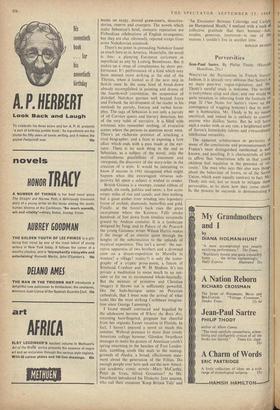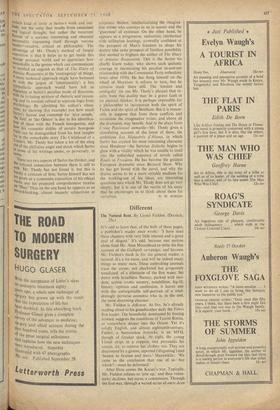Perversities
Jean-Paul Sartre. By Philip Thody. (Ham Hamilton, 21s.)
sh
ry is r. ng be )(I he n- ns art ve 'Sc TY
of of ell im ng
is.
g5 let
se a
WHATEVER the fluctuations in French Men fashion, it is already very obVious that Sartre' no mere post-war vogue-reputation, and rs Thody's careful study is welcome. The writi is everywhere crisp and clear, and one would quite mistaken in inferring from the footnote page 32 ('See Notes for Sartre's views on I contingency of wiggling bottoms') that its nu ner is humourless. Mr. Thody is by no mel. uncritical, and indeed he is unlikely to con" anyone who dislikes' Sartre. But he will lea such a reader with, at any rate, a heightened set of Sartre's formidable talents and extraordinz intellectual versatility.
The apparent arbitrariness or perversity many of the conclusions and pronouncements France's most distinguished intellectual is sh known, and puzzling. It is characteristic of h to affirm that 'observation tells us that you children feel repulsion in the presence of cosity.' The man who says this also says this about the behaviour of lovers, or of the Sov Union, which seem equally contrary to fact. Thody sets out, not so much to mitigate till perversities, as to show how they come abo Ire the process he succeeds in demonstrating certain kind of unity ;n Sartre's work and out- look; not the unity that results from consistent and logical thought, but rather the recurrent flavour of a curious, interesting and obsessed Personality expressing itself through various Modes,---creative, critical or philosophic. The advantage of Mr. Thody's method of limpid exposition is that it helps us to get inside this strange personal world and to appreciate how remarkable is the genius which can communicate so rarefied an anguish as that of The Diary of lnioitte Roquentin at the 'contingency' of things.
More technical approach might have bemused I's with the jargon of 'intentionality'; a less YmPathetic approach would have left us ull
with at Sartre's peculiar mode of discourse, its irritating mixture of rhetoric and reason- ing, and its resolute refusal to separate logic from PsYehology. By admitting his author's obses- sions, by showing (for example) just how much 1/4Sartre's hatred and contempt for 'nice People: ..t.ue Just' or 'the Others' is due to his identifica- Z°t1 of them with the French bourgeoisie, and t's'°%!' his romantic dislike of certain bourgeois ;SAS can be distinguished from his best insights L'as In the remarkable story The Childhood of a „Wei), Mr. Thody has taken a lot of the sting rut of the philistine anger and shock which Sartre .11 some of his writings seems, so perversely, to
There are two aspects of Sartre the thinker, and
the rational connection between them is still to seek. Mr. Thody has not found it, but this is hardly a criticism of him; Sartre himself has not yet given us a systematic exposition of his ethical views, nor his projected comprehensive treatise °11 `Man.' Thus on the one hand he appears as an inward-looking, almost insanely subjectivist or solipsistic thinker, intellectualising the imagina- tive writer who conveys to us la nausee and the 'glueyness' of existence. On the other hand, he appears as a progressive. melioristic intellectual with utilitarian leanings, avowedly confident at the prospect of Man's freedom to shape his destiny (the same prospect of limitless possibility that seemed to frighten the author of The Diary of Antoine Roquentin). This is the Sartre we chiefly know today, who shows such quixotic courage in maintaining his peculiar in-and-out relationship with the Communist Party orthodoxy (even after 1956). He has flung himself on the wheel of Marxism; it refuses to turn, but he remains stuck there still. The 'tension and ambiguity' (to use Mr. Thody's phrase) that re- sults from this duality may be a grave fault in an abstract thinker; it is perhaps impossible for a philosopher to incorporate both the spirit of Fichte and the spirit of Bentham. But it is reason- able to suppose that from these conflicts and revulsions the imaginative writer, and above all the dramatist, may benefit. And in the plays from Crime Passionnel onwards—Mr. Thody gives a stimulating account of the latest of them, the ambitious Les Sequestres d'Altona, in which Sartre has created his most interesting character since Hoedercr--the Sartrian dialectic begins to glow with a vitality which he was unable to instil into the unfinished sequence of novels called ROads to Freedom. He has become the greatest European dramatist since Bernard Shaw. Why he has got bored with the novel, and why the drama seems to be a more suitable medium for the working-out of his ideas, are interesting questions into which Mr. Thody does not go very deeply; but it is one of the merits of his essay that he encourages us to think about them for















































 Previous page
Previous page